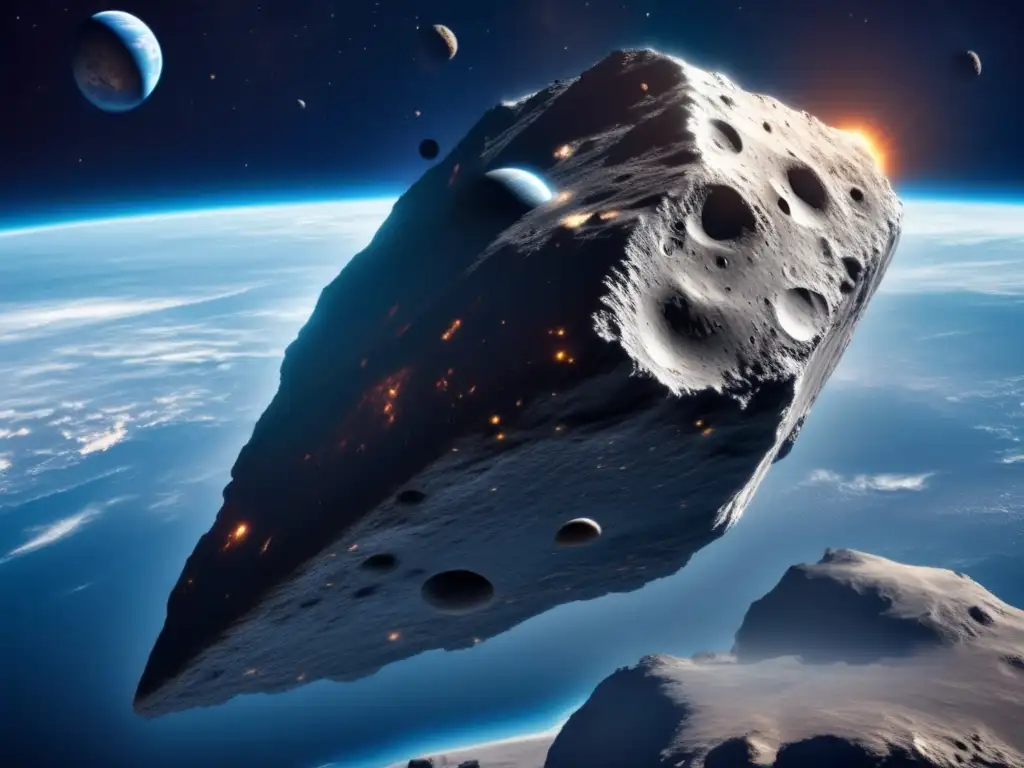The Final Frontier: Strategies For Asteroid Defense

Introduction
Asteroids are a constant threat to our planet. If one were to collide with Earth, the impact would be catastrophic, causing massive destruction and potentially even the extinction of the human race. It is imperative that we develop strategies to defend our planet from these cosmic dangers.
Current Strategies for Asteroid Defense

Observation and Detection
One of the most critical components of asteroid defense is observation and detection. Scientists continuously monitor the skies, looking for any asteroids that may pose a threat to Earth. This allows us to prepare for an impact potentially years in advance and take action to deflect or destroy the asteroid before it reaches our planet.
Deflection Techniques
Deflection techniques involve altering the trajectory of an asteroid to prevent it from colliding with Earth. One method is to use a spacecraft to fly alongside the asteroid and use its gravity to slowly tug it off course. Another strategy involves using a kinetic impactor, which is essentially a spacecraft that slams into the asteroid with enough force to alter its trajectory.
Destruction Techniques
In some cases, deflection may not be possible, and destruction becomes the only viable option. One method is to detonate a nuclear weapon near the asteroid, which creates a shockwave that pushes it off course. Alternatively, multiple smaller impacts by non-nuclear devices could also be used to break up the asteroid into smaller pieces that burn up harmlessly in the atmosphere.
Funding Issues and Future Challenges

Budgetary Constraints
Developing and implementing effective asteroid defense strategies require significant resources. Unfortunately, funding for asteroid defense is often low on the priority list of government agencies and governments. It is crucial to recognize the importance of investing in asteroid defense to prevent a catastrophic impact.
New Technologies
As we continue to advance technologically, new asteroid defense strategies may become available. For example, using lasers or other directed energy technologies to vaporize an approaching asteroid could potentially be more effective and precise than using traditional kinetic impactors.
The Role of International Cooperation

Coordination between Space Agencies
Asteroid defense is not just the responsibility of one nation or space agency. It is a global effort, and international cooperation is necessary to develop effective asteroid defense strategies. Coordination between space agencies allows for shared knowledge and information, pooling of resources, and better overall preparedness.
Political Implications
International cooperation on asteroid defense also has significant political implications. It is essential to ensure that effective asteroid defense strategies are developed and implemented in a way that promotes peace and cooperation between nations.
Frequently Asked Questions

-
How likely is an asteroid impact?
The chances of a catastrophic asteroid impact are relatively low, but the potential devastation makes it a high priority threat for scientists to monitor and prepare for.
-
What is the most significant asteroid impact in history?
The Chicxulub impact, which occurred 66 million years ago, is the most significant asteroid impact in history. It caused the extinction of the dinosaurs and 75% of all life on Earth.
-
Can we predict exactly where an asteroid will impact?
No, it is impossible to predict an asteroid impact with complete accuracy, but scientists can estimate the potential impact area based on the asteroid's trajectory.
-
What government agencies are responsible for asteroid defense?
The National Aeronautics and Space Administration (NASA) and the European Space Agency (ESA) are two of the primary space agencies responsible for monitoring and developing asteroid defense strategies.
-
How can I help support asteroid defense efforts?
You can support asteroid defense efforts by advocating for increased funding, promoting international cooperation, and spreading awareness about the importance of asteroid defense.
Conclusion
Asteroid defense is a critical issue that requires immediate attention and action. We must develop and implement effective strategies to prevent a catastrophic impact that could potentially wipe out human civilization. By investing in observation and detection, deflection and destruction techniques, and international cooperation, we can mitigate the threat of asteroids and ensure the safety of our planet for generations to come.
Thank you for reading, and please share your thoughts in the comments section below. For more information on asteroid defense, visit www.asteroidrealm.com.
Additional Resources

For those interested in delving deeper into the asteroid topic, the following resources may be helpful:
- NASA Center for Near Earth Object Studies
- ESA Near Earth Objects
- Planetary Defense, The Planetary Society
 Safeguarding The Skies: How We Defend Against Asteroids
Safeguarding The Skies: How We Defend Against Asteroids Between A Rock And Our Place: Asteroid Defense Strategies
Between A Rock And Our Place: Asteroid Defense Strategies The Art Of Asteroid Defense: Current Techniques And Tools
The Art Of Asteroid Defense: Current Techniques And ToolsIf you want to discover more articles similar to The Final Frontier: Strategies For Asteroid Defense, you can visit the Planetary Defense category.
Leave a Reply

Articulos relacionados: